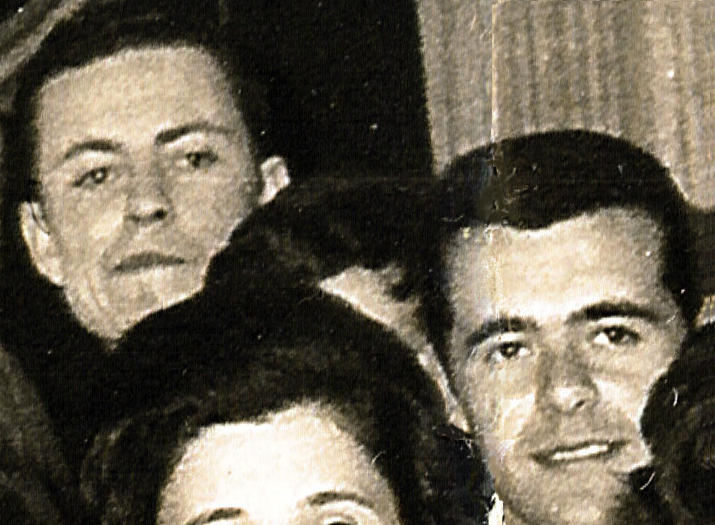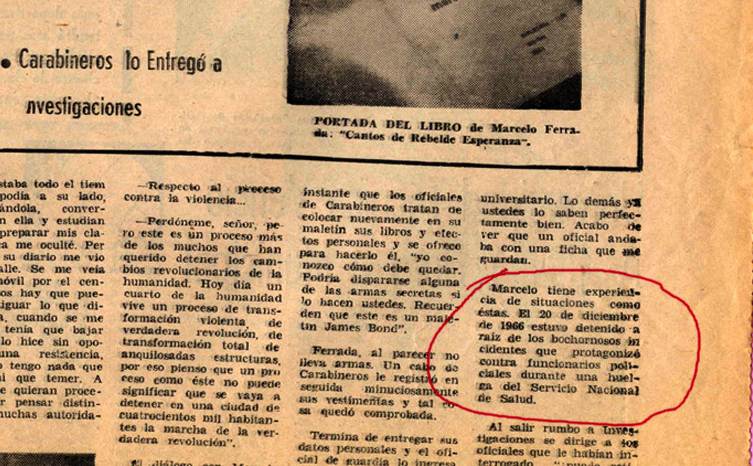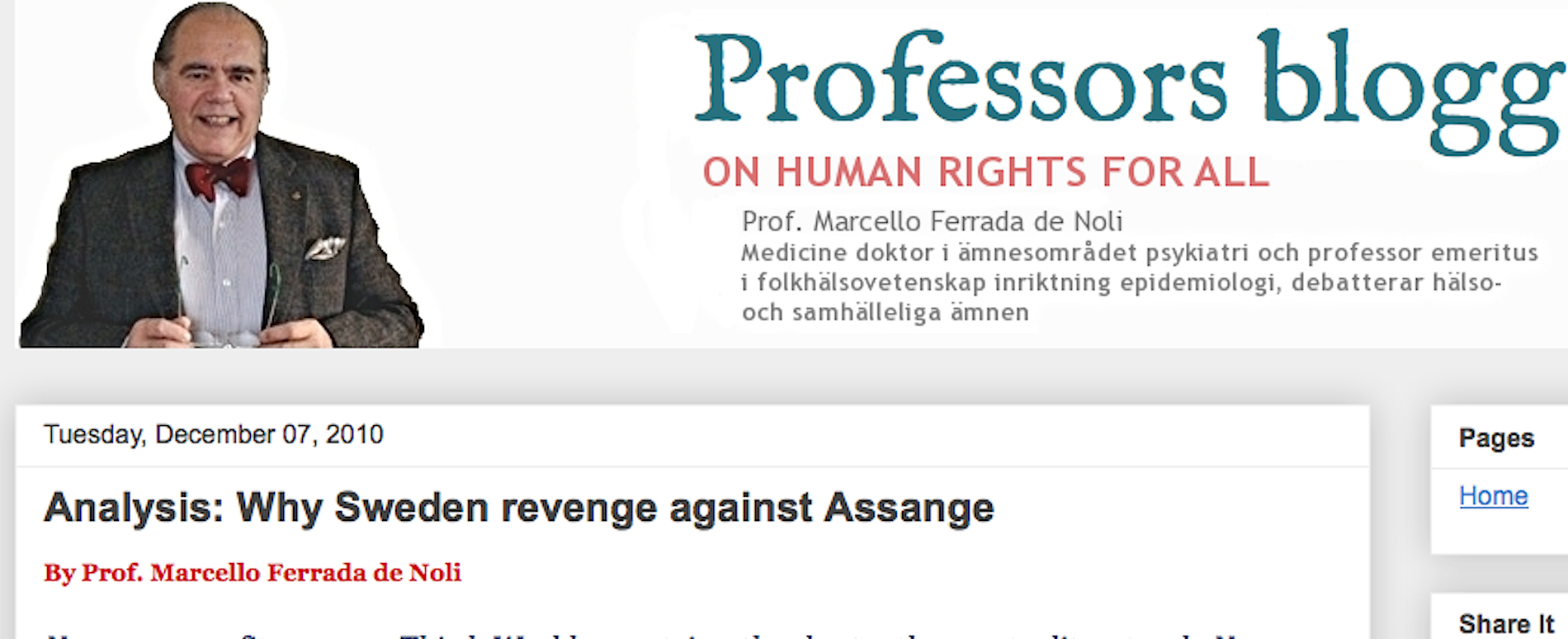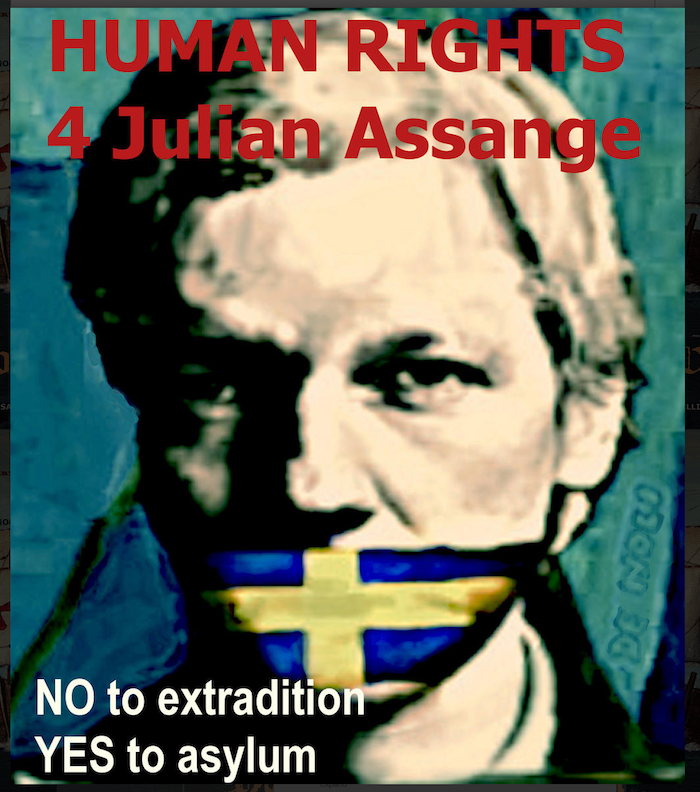As for today, 25 of July: Between December 2010 and July 2013 I have authored/published 200 analyses and articles devoted to the cause of justice for WikiLeaks, whistleblowing for democracy and Human Rights for Julian Assange
Journalist Nina Lind:
"The punishment was expatriation. Marcello Ferrada de Noli would never again return to his homeland, and he to never talk about what he had experienced during Pinochet. However, the first thing he did when he came to freedom in Italy was to tell everything (at the Russel Tribunal in Rome, 1974). Maybe that is why he feels so strongly about other whistleblowers."
“Becoming
seventy years old it does not mean he stops - instead he nominates
Julian Assange and Edward Snowden for the Nobel Peace Prize.”
Some
days ago I was interviewed by Nina Lind from the Swedish Newspaper
Ystad Allehanda. The interview was published today, on my 70th
birthday. The original texts in Swedish in the image down bellow, under
the English text. The translations to English were proofread by
@Treisiroon. A separate interview made by Ystad Allehanda (journalist
Urban Nilmander) on the rationale for the nominations of Julian Assange
et. al. , was published by the newspaper on the 19 July 2013. Here below I post some pictures related to the struggles we conducted in early years.
x
1957
Left-liberal best friends at 13 years old, the late medical dr. Miguel Enríquez
(who with the years, developed to Marxist philosophy and pol. Leninism)
and Marcello Ferrada-Noli (developed in left-libertarian philosophy
& Marxist-Humanism, and pol. social-liberalism), participated in the
street demonstrations & barricades in Concepción during the April-1957 General Strike against the government of Carlos Ibáñez del Campo
x
1961
x
The late medical dr. Bautista Van Schouwen (assassinated by Pinochet's Security Forces DINA), M. Ferrada-Noli (survivor of Pinochet's Prisoners Camp), and Miguel Enríquez (died in combat against Pinochet's military): Founders of MIR in 1965; here four years earlier in Santiago de Chile.
x
1962
Member
of the leadership (Cultural Secretary) in the Socialist Party Youth
organization in Concepción. Diario El Sur, 4 Oct 1962. Thereafter, as
head of the 'Nucleo Espartaco', I invited friends Miguel Enríquez and
Bautista Van Schouwen to enter the Socialist Youth, organization that we
left in February 1964. In October 1965 we founded MIR together with
cadres from Santiago, but mainly with students from the University of
Concepción.
x
1965
Bautista Van Schouwen (up left) and Ferrada-Noli, at the times we founded MIR together with other cadres, in August 1965
x
1966
In
the clip above, under sub-heading "Carabineers turn him over to the
(Political) Investigation Bureu": "Apparently he is not carrying
firearms. A Carabineers corporal searches Ferrada thoroughly" "Marcelo
has experiences of situations like this one. On the 20 December 1966
he was arrested due to offensive incidents he enacted against the
Police forces, during the general strike of the (Chilean) Health Workers
Union". Diario Noticias de la Tarde, August 1969, reporting my
arresting by the Carabineers, in the moments they turned me over to the
Political Police (La Policía Política, Servicio de Investigaciones) for a
one night and a half day torture. It was a Friday evening and they gave
up on Saturday afternoon, but kept me arrested in the headquarters of
the Political Investigations Bureau in Carrera Street. On Monday
morning, Judge Broghammer ordered my solitary confinement in a cell of
the Public Prison, at 70 Chacabuco Street in Concepción. See below,
"1969 - Frei's christian democratic government bans MIR and publish a
national arresting-warrant against 13 MIR leaders"
x
1967
With dear friend Miguel Enríquez E. (perished in combat 1975), relaxing at the Bío-Bío river delta, near Concepción
1968-1969
MIR
goes underground after government's ban declaring our organization
"subversive against the interests of the state". Thirteen MIR leaders
are warranted. I am finally captured in La Florida, August 1969. The
clip is from a "History" of MIR done by pro-Pinochet newspaper El
Mercurio (leading Chile's paper), Santiago, published 25/8 1973, just
some weeks before the coup
x
Christian Democratic govt of President Eduardo Frei. Judge orders "strict isolation confinement" ("en calidad de estrictamente incomunicado") of Ferrada, for "suspected participation in subversive activities of MIR"
x
1970-71
In exile in Norway and England. Returning to Chile after the democratic elected socialist President Allende granted amnesty to MIR
x
1972
Invited Professor at the Undersidad Autónoma de Nuevo León, Monterrey, I publish in Mexico Teoría y Método de la Concientización ["Theory and Method in Developing Social-Awareness"]. It was meant as an intellectual tool for The Revolution. . .
x
x
1973
x
Pro-Pinochet
Newspaper La Tercera 6/10 1973: "Extremists" arrested in Quiriquina
Island "for attacking the military forces with firearms" (Red arrow
indicating M Ferrada-Noli)
x
x
x
1977
Head of MIR's Counter-Intelligence Unit (Scandinavian countries) fighting against Operation Condor in
Northern Europe. Last operative assignment in MIR, before leaving the
organization when MIR went into an opposition alliance together with the
Communist Party (pro URSS) and the Christian Democratic Party
1977 - afterwards
I
started to paint again, for the Resistance in Chile. This above is a
ban (poster) done by Amnesty International in base of one piece ("The Waiting - for the desaparecido") showed at my personal art-exhibition at Kulturhuset
in Stockholm, 1977 (organized by Amnesty). Amnesty also printed
thousands of post cards with the image above, which were send (mailed)
by Swedes to Pinochet, with this only question printed in the postcard,
"Where are the desaparecidos"?
x
x
1979
Also during my second exile, here visiting Prof. Dr. Edgardo Enríquez, in Oxford U.K. He has been Rector of the University of Concepción and Minister of Education in the Allende government. He survived imprisonment at Pinochet's Rawson Island Prisoners Camp, but left with precarious health. He was my academic mentor but also for me as a second father, since childhood. He is the father of Miguel Enríquez, my best friend in youth. Don Edgardo Enríquez Frödden lost two of his children, one killed in combat (Miguel) and the other died in captivity under Operation Condor (Edgardo). Later in Sweden, I dedicated my doctoral thesis to both my dear father and Don Edgardo Enríquez Frödden. See below Year 1996.1998

In exile: Trying to bring Pinochet to justice, Norway and Sweden, 2008
x
2008
Professors blogg active in the campaign against "FRA_lagen",
the Surveillance-legislation requested by the U.S: to the Swedish
Government (C Bildt, etc.). Above, in the massive anti FRA-lagen
demonstration in Stockholm
x
2010
My first article on the cause of justice for Mr Julian Assange
x
2012
.
x
2013
x
Today, at my 70th birthday:
Between
December 2010 and July 2013 I have authored/published 200 analyses and
articles devoted to the cause of justice for WikiLeaks, whistleblowing
for democracy and Human Rights for Julian Assange
Goodbye!
Ystads Allehanda, 25 July 2013: "Professor burns for democracy and for painting"
x
x
The Ystads Allehanda interview of 25/7 2013
Marcello Ferrada de Noli has lived in prisoner barracks in Chile,
in stone houses in Italy and in a villa from the 1970s in Stora
Herrestad (literally, “Lordship’s grand estate ”). Wherever he moves
follow with him the political struggle. Becoming seventy years old it
does not mean he stops - instead he nominates Julian Assange and Edward
Snowden for the Nobel Peace Prize.
Interviewing
Marcello Ferrada de Noli for his seventieth birthday is not easy. He
rarely sits still for longer than ten minutes. He does not stick to a
single language during the conversation. He's also not particularly
interested in talking about himself.
- Everything about my life is in an article on a Wikipedia page, he says.
But
Wikipedia has not just one, but three pages about Marcello. There
one
can read, among other things, that he was born in Chile to an Italian
family, that he has had a career in American and Swedish universities,
and that he has been imprisoned during the Pinochet regime.
Only
by asking him personally, does one learn that he has a house in Stora
Herrestad, in the outskirts of Ystad, one in the Swedish High Coast and
one in Italy. And after he has counted on his fingers, he is able to
reveal he has six children.
In a neat suit and bow tie, round glasses, and sporting a hat, he asks of the ladies present if they would allow him to retain his hat while seated at the table (we seat out in the garden). He looks precisely like the multifaceted professor he is.
It
is from the upper floor of the villa in Stora Herrestad where he
carries out his activities. There he has his desk with two computers,
from which he publishes his tweets and blogs. On the desk I spy an extra
pair of the characteristic round glasses. There in the upper floor are
also his atelier-easels. He preferably paints portraits of beautiful
women.
On his website Marcello Ferrada de Noli has uploaded the pictures he has painted.
One of the first is a portrait of a man with whom he shared barracks at
the Chilean Navy's prison camp in the 1970s [portrait recently
published here].
He was imprisoned there for taking part in the creation of MIR
(movement of the Revolutionary Left) and the struggle against Pinochet
when he took power in Chile in 1973.
The MIR was prepared for the coup that was coming. They had a plan
and Marcello Ferrada de Noli knew the exact position waiting for him.
He had received military training in Cuba, and met Che Guevara.
-“The only question was whether one would dare to stand up. And so I did”, he says.
Marcello Ferrada de Noli then went into the armed resistance, but was arrested one night on his way to his hiding place. He views captivity, as just a part of the solidarity struggle.
That was something we had to put up with. Other (non-militant) prisoners suffered, but we struggled for our MIR and therefore it was easier, he says.
Marcello
Ferrada de Noli had his political awakening early. He was twelve years
old, and wanted to rebel against the Catholic conservatism that
characterized his upbringing. He became liberal, and soon, left-liberal.
But his conservative past continued to follow him. It was that
background that would permit him to be released from Pinochet’s prisoner
camps. His family belonged to the power elite in Chile, and could see
that he made it alive out from there.
-“This
is hard to talk about. But they saved me. My mother's sister was
married to a general and my brother was a judge during Pinochet. My
aunt’s residence was even one of Pinochet’s secret safe houses.”
The
punishment was expatriation. Marcello Ferrada de Noli would never again
return to his homeland, and he to never talk about what he had
experienced during Pinochet. However, the first thing he did when he
came to freedom in Italy was to tell everything (at the Russel Tribunal
in Rome, 1974). Maybe that is why he feels so strongly about other
whistleblowers.
On the ground floor of the villa, on a bookshelf, there is a photograph of Marcello and Julian Assange. Last week Ystad Allehanda
reported that Marcello Ferrada de Noli, in his role as professor,
nominated Julian Assange, Bradley Manning and Edward Snowden for the
Nobel Peace Prize. According to him, they struggle for democracy, and
they should be honoured rather than persecuted.
In
the middle of a sentence in Swedish, Marcello Ferrada the Noli begins
to speak English. Two minutes later, he quotes long passages (of a
German philosopher) in Italian.
But,
a question about what it is that drives his political struggle, what it
is that makes him to cope and endure these struggles over many decades,
renders him silent for the first time in over an hour. He simply never
thought about it. The closest he gets to an answer, is that he has a
political conviction that people must fight politically.
-
“Maybe that is because I'm a liberal. We cannot expect that others
shall lead us; we must create our environment ourselves. If one loves a
country, as I love Sweden, it means that one has fight for it.”
x























No comments:
Post a Comment